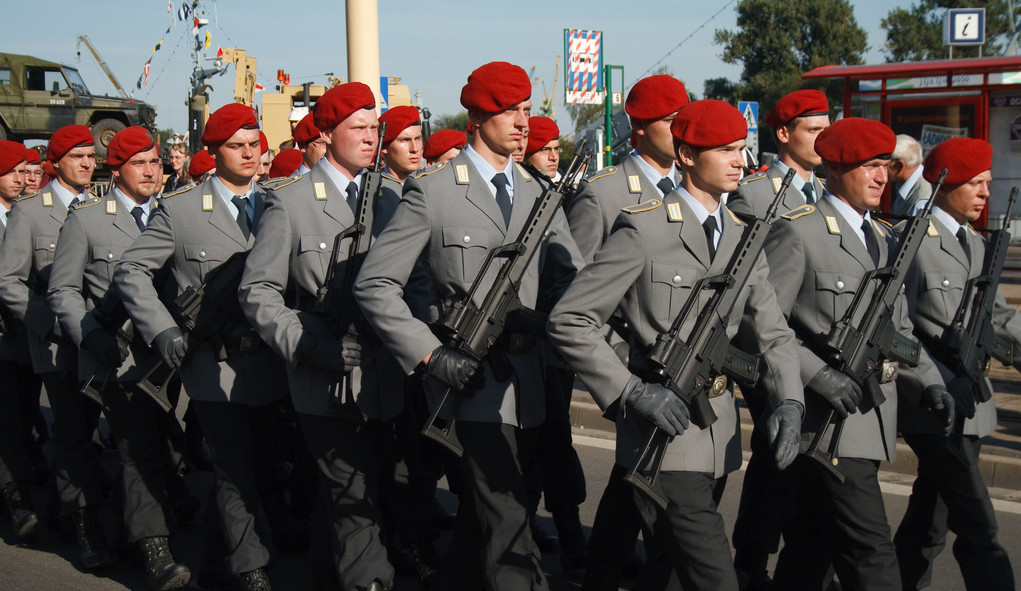“War” is a loaded term in Germany. It comes as no surprise, then, that ever since the end of World War II, German voters have been notoriously averse to military intervention abroad. Their skeptical attitude traces back to the devastation brought about by Nazism’s expansionary drive and was consolidated in later decades, particularly in the early 1980s, when a peace movement against the inexorable Cold War logic of mutually assured destruction mobilized hundreds of thousands of citizens.
This attitude continues to affect the country’s security politics. In clear contrast to its neighbor France, which is bombing ISIS in Iraq and conducting military operations across the Sahel region, Germany has refused to participate in international interventions such as the 2003 Iraq invasion and the 2001 Libya campaign. Any involvement in military intervention has been accompanied by sustained and controversial public debates. German politicians went to great lengths to cast participation in the ISAF mission in Afghanistan as anything but war – instead, Germany purportedly sent its troops for “state-building”, “security assistance” and “humanitarian self-defence.” Most recently, Germany rebuffed US calls for military support to Ukraine. But beneath this surface of apparent restraint and caution, things are not that simple – nor peaceful.
Firstly, there is the issue of weapons. Over the last decade, Germany has been the world’s third largest weapons exporter, surpassed only by the US and Russia. Weapons exports must be approved by the government, and the official policy has been not to deliver arms into conflict zones or to politically repressive regimes. This, however, has not kept Germany from doing both. In fact, Germany’s weapons exports into states that are neither part of the EU nor NATO peaked in 2013 and included Saudi Arabia, Israel or Algeria, to name but a few problematic cases. Tanks and armored vehicles have been export hits, but so too have small arms, which cause the most deaths in conflict zones around the world – like in Mexico, where weaponry used by criminal cartels and corrupt police forces has been traced to German manufacturers like Heckler & Koch. Germany is thus not only contradicting its own policy goals, but indirectly fueling conflicts and bolstering authoritarian regimes across the globe.
However, change is afoot. The new Minister for Economic Affairs has vowed to rein in exports to questionable recipients and recently there seem to be some positive developments. The government has halted exports to numerous authoritarian regimes, including Saudi Arabia. Some government politicians question the strategic viability of stricter regulation and the weapons industry’s lobby is pushing against this challenge to its economic interests. Though these recent developments allow for some optimism, it is unclear which side will prevail in the long run.
Another trend in German politics appears to push the country in a third direction. Specifically, Germany’s reluctant position on military intervention might be evolving. While not actively participating in the fight against ISIS, Germany has been training and supplying Kurdish military forces with arms. Thus, the country is in the paradoxical situation of scaling down its arms exports overall while simultaneously breaking a previous taboo and openly sending weapons into a war zone. What makes the latter acceptable in the eyes of German politicians is that the rifles and RPGs sent to the Kurdish peshmerga are seen as Germany’s contribution to an international effort in the war against ISIS.
This step came shortly after several prominent German politicians called for a more active role in international affairs, especially in security politics. They did so stressing that Germany must not let its historical consciousness turn into an excuse for opting out of operations that are in line with its own strategic interests. Interestingly, this change in rhetoric is not the result of a bottom-up reversal of Germans’ attitude to war. On the contrary, the majority of the population is still skeptical, with more than two thirds opposing military assistance to the peshmerga. This suggests that the policy change was not prompted by electoral considerations, but by concern for Germany’s international standing. Indeed, the country’s reticent stance has earned it some criticism, especially from fellow NATO members who have come to see Germany as an unreliable partner that only ever engages itself “too little or too late“. Whether the new position will eventually resonate with German voters remains to be seen, although popular discontent in international matters is unlikely to affect the government’s relative popularity.
If the differing signals in Germany’s military policy allow one certain conclusion, it is the following. Despite its significant political and military clout, Germany is marked by profound uncertainty and confusion regarding its security politics. For historical reasons, it is hesitant to assume any military leadership role or push for interventionism, while external pressures demand a more active behavior. The recent realization that its arms exports – a more indirect, but nonetheless highly consequential form of military politics – are untenable is a positive development that bodes well for the continued evolution of German foreign policy.
Concerning Germany’s involvement in international military operations, the answer is more complicated. Indeed, Germany must live up to the fact that what counts as justified restraint for reasons of historical consciousness domestically can be seen internationally as shirking responsibilities. But that does not mean Germany ought to reorient itself entirely towards proactive interventionism à la France. At times, a moderating voice calling for restraint can be incredibly valuable to prevent escalating a protracted conflict like the one currently raging in the Ukraine. Thus, the global community should hope that Germany can retain some of its caution even as it seeks to recast itself internationally.
